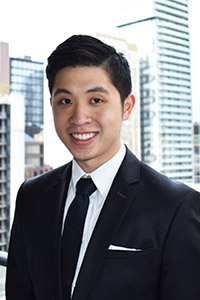Beyond the Classroom: Student Ryan Chan’s Impactful Coursework
 For recent Trinity grad Ryan Chan, taking part in Trinity’s Community Research Partnerships in Ethics course meant a chance to work with a leading conservation organization: the World Wildlife Fund. As part of Trinity’s Ethics, Society & Law (ES&L) program, select students in their final year of study are invited to enrol in CRPE. The course provides students with a unique opportunity for experiential learning, allowing them to conduct ethical research through partnerships with community organizations.
For recent Trinity grad Ryan Chan, taking part in Trinity’s Community Research Partnerships in Ethics course meant a chance to work with a leading conservation organization: the World Wildlife Fund. As part of Trinity’s Ethics, Society & Law (ES&L) program, select students in their final year of study are invited to enrol in CRPE. The course provides students with a unique opportunity for experiential learning, allowing them to conduct ethical research through partnerships with community organizations.
While working with the WWF, Ryan conducted high-level research on one of the organization’s key objectives: evaluating and strengthening the Frontier Offshore Regulatory Renewal Initiative (FORRI). “My work with the WWF focused on the appropriateness of the Government of Canada’s proposed risk management mechanism that requires operators to ensure ‘as low a reasonably practicable’ (ALARP) levels of risk,” Ryan explains.
During discussions with the WWF, Ryan noted concerns the organization had with the way the term “reasonable” was used in FORRI. It was a subject Ryan was prepared to tackle. “In the ES&L program, we have been taught time and time again that ambiguity in the law can be quite problematic and have encountered difficulties with the term ‘reasonable’ many times,” he says. Armed with this knowledge, Ryan helped the WWF explore this issue through his CRPE course work. “I thought it would be very interesting to examine what this unique combination of words, “as low as reasonably practicable” (ALARP) meant and to examine its applicability from various lenses,” Ryan says. “While I was writing my paper, I was in constant contact with the WWF, updating them on my findings. They, in turn, were in contact with the federal government. Ultimately, my CRPE research rejected ALARP in its current form as morally problematic, inconsistent with international practices, and lacking legal clarity.” Ryan’s research proved so helpful to the WWF that his findings made up a notable component of the organization’s response to FORRI, which they submitted to the federal government.
“We’re proud of Ryan and the work he is doing with the WWF,” says Acting Associate Director of the ES&L program Dr. Stephanie Silverman. “Ryan’s accomplishments in the CRPE program speak to his own research potential and efforts, as well as the wonderful things that happen when the university partners with community agencies and empowers students to shape and pursue their own research goals.”
Ryan is quick to point to the unique aspects of the ES&L program that provided him with the experience needed for his important work with the WWF. “Unlike other majors, this relatively small program allows for a much more personalized education aimed at our particular interests,” he says. “We have been taught how to read and single out key components of cases and litigation, and learned how to consider policy issues from the lenses of ethics, society and law.”
Now in his first year at University of Toronto Faculty of Law, Ryan is among some familiar faces. “I believe it’s no surprise that six of the students admitted to the CRPE program were accepted to U of T Law,” he says. “The research and writing skills I’ve developed will undoubtedly be of tremendous help in law school, and certainly puts us at an advantage in terms of reading and understanding cases and legal rules quickly.”
While studying law, Ryan is also continuing to his work with the WWF, completing another paper on Canada’s offshore oil and gas liability regimes. “I am incredibly grateful to the CRPE program for giving me the unparalleled opportunity to work with an amazing organization and effect real change in the law and to society as a whole,” he says.
Learn more about Trinity’s unique CRPE program.
Categories: Academic; Arts & Science; Ethics, Society & Law; Student News


